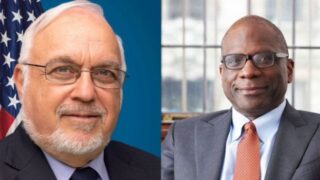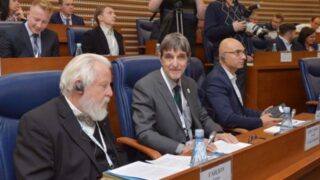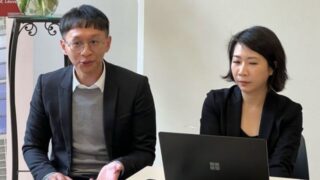Interviews with students from different countries and religions highlighted the universality of the principles Tai Ji Men promotes and affirms.
by Huang Hsin-Yung*
*A paper presented at the CESNUR 2023 international conference, Vilnius, Lithuania, June 21, 2023


I am currently working at a master’s degree in Supply chain management at Saint Louis University, a Catholic university in the United States. The campus promotes religious freedom through dedicated spaces for worship and observance of religious holidays, fostering a respectful environment.
For this conference, I collected perspectives on religious freedom from a diverse cohort of students hailing from six distinct countries and adhering to four major religions, namely Catholicism, Protestantism, Islam, and Hinduism.
Mary Lizbeth Rojas from Bolivia is a practicing Catholic. She espouses the notion that individuals possess the inherent right to embrace their own religious convictions. The responsibility of governments, therefore, lies in the normative obligation to uphold and safeguard the rights to religious freedom.
Casey Jaeger is from the United States and Becky (last name omitted) is from Nigeria. Both are Protestant Christians. Casey told me that religious faith serves as a conduit for fostering physical, mental, and spiritual well-being. He also argued that religious faith upholds the moral freedom of individuals, while denying freedom of religion can lead to societal disintegration. Similarly, Becky calls for mutual respect and coexistence among religious communities. Governments should ensure the unhindered practice of faiths, protect them against persecution, and create an environment free from fear and discrimination.
The significance of religious freedom was also underscored by Mohsin Javaid from Pakistan and Yakhyo Omonov from Uzbekistan, both devout Muslims. Mohsin Javaid advocated for the unrestricted freedom of religious beliefs and practices. Similarly, Yakhyo Omonov emphasized that both the populace and the government should foster an environment characterized by friendliness and respect towards diverse faiths. Finally, I engaged with Manisha Reddy Lankela from India, a Hindu. She highlighted India’s commitment to religious equality and the government’s role in fostering social harmony and religious freedom, despite persistent problems.


In all the above interviews, I found three common key points: recognizing freedom of religion as a fundamental right, treating different religions equally, and affirming the government’s responsibility to protect religious liberty.
From my own perspective, religious faith fosters social stability, harmony, and sustainability. Thus, religious freedom is a crucial human right, enabling individuals and groups to freely express and practice their beliefs.
Through those interviews, I observed the confidence in and support of my interviewees for their respective governments’ commitment to religious freedom, even where problems do exist. However, when questioned in turn about my own country’s approach to this matter, I found myself hesitant to discuss Taiwan’s government’s support and endeavors in safeguarding the basic rights and religious freedom of its citizens.
One specific case that I perceive as a violation of religious freedom and human rights, which started 27 years ago, is the Tai Ji Men Case—an instance where political persecution disguised itself as a crackdown on religious activities. This serves as an illustration of how, in my opinion, the Taiwanese government has not effectively safeguarded the people’s right to religious freedom, resulting in state-sanctioned violence and human rights violations.
Without delving into the details of the Tai Ji Men Case, discussed by other speakers in this panel, I would like to share my personal journey within Tai Ji Men, which is also the reason why I am here today. Tai Ji Men has been an integral part of my family for three generations, and I was raised in its nurturing environment. Under the guidance of my Shifu (Grand Master), I absorbed the values of filial piety and conscientious conduct.


Last July, my grandmother fractured her hip, making her immobile and dependent on assistance. During this difficult time, my parents managed her diet while my sister and I washed her hair and feet. With the collective efforts of our family, love, and care, she eventually recovered. Inspired by my Shifu’s profound words about family, I have learned the importance of acknowledging each other’s struggles and fostering tolerance, understanding, and compassion. Because of the teachings of my Shifu, I now grasp the significance of conscience and gratitude. From the expression of love in daily life to the global endeavors in promoting love and peace across continents, Tai Ji Men holds a spiritual abode within my heart, with conscience serving as my guiding faith. Apparently, the key to resolving the Tai Ji Men Case also lies in conscience.
Throughout the prolonged 27-year period of human rights persecution faced by Tai Ji Men, my Shifu, and his disciples have consistently advocated and practiced the principles of peace, love, and conscience.
To date, disciples of Tai Ji Men, under the guidance of Dr. Hong Tao-Tze, have traveled throughout the world, hosting summits and inviting leaders from various fields to partake in the ceremonial ringing of the Bell of World Peace and Love. Through traditional martial arts, dance, and singing, Tai Ji Men believe they effectively spread the power of goodness to awaken the conscience within people’s hearts. I have also joined in spreading the seeds of conscience with my Shifu in Australia, Turkey, and the United States.
At the 2019 World Taxpayer Rights Conference in Australia, we engaged with experts and scholars from diverse backgrounds who shared their perspectives on national tax systems and presented successful case studies. We witnessed their unwavering commitment to justice, irrespective of ethnicity, and the importance of protecting human rights. This experience underscored the profound impact of conscience in fostering global peace.


Last June, we traveled to Türkiye to participate in the 25th Eurasian Economic Summit. Despite the threats posed by the pandemic, wars, and climate change to human lives and sustainable development, my Shifu continues to lead disciples in spreading a culture of peace and conscience, striving for a sustainable future. Additionally, in March of this year, I, along with my Shifu and fellow disciples, organized the World Leader Summit in New York. We actively advocated for the establishment of World Prayer Day and the World Day of the Power of Hope, which aim to encourage individuals to face international and national crises with compassion, courage, and genuine wisdom, actively seeking peaceful, harmonious, and effective solutions for the betterment of the Earth and humanity.
Incidents of religious persecution are not exclusive to either democratic or non-democratic nations. In anticipation of International Human Solidarity Day. On December 19, 2022, Dr. Hong Tao-Tze proclaimed this date as the International Day Against Judicial and Tax Persecution by State Power. The date remembers the start of the Tai Ji Men case on December 19, 1996, and commemorates victims worldwide who have endured government misuse of power through criminal prosecution or discriminatory taxation, thereby obstructing their rights to life and cultural development.
It also urges governments globally to uphold the principles enshrined in the Universal Declaration of Human Rights, safeguard human dignity, prohibit discriminatory practices by employing state power, and ensure fundamental and impartial rights concerning taxation, religious freedom, freedom of speech, and cultural development. Additionally, it aims to inspire conscientious human rights advocates worldwide to be vigilant of such occurrences and speak out against them. I firmly believe that this exemplifies a collaborative international endeavor among global citizens in the pursuit of justice.
Finally, I would like to emphasize that only through advocating religious freedom with love and conscience, safeguarding the dignity of humanity, and defending human rights, can we build a society governed by conscience and benevolence that promotes the well-being of the people and the prosperity of the nations, thereby creating welfare for all. I also believe that justice and righteousness will not remain forever hidden, that the inherent goodness of human nature will ultimately triumph over the temptations of malevolence, and that proactive governments should prioritize the well-being of their people, rectify errors, and strive to create a sustainable future with conscience.









